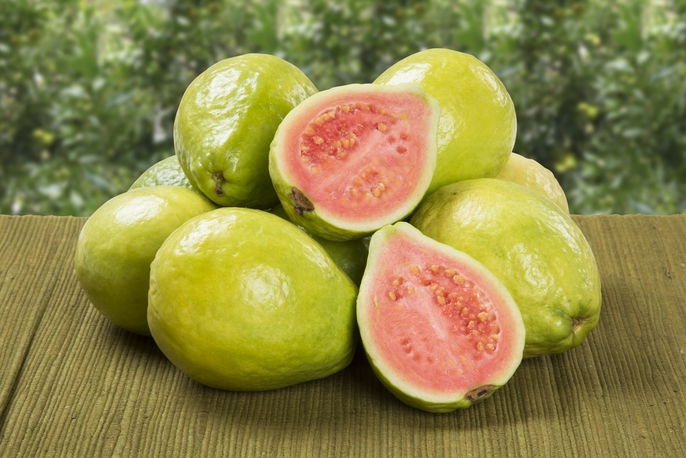Guava benefits, like improving gut health, boosting immunity and promoting weight loss, can be achieved by eating this fruit whole, juicing it or adding it to dessert recipes. Guava leaves can also be used to prepare teas.
Guavas are a great source of fiber, antioxidants and other nutrients like vitamins A, B and C. Its benefits are made possible due to its many properties, including antioxidant, antidiabetic, antihypertensive, anti-inflammatory, analgesic, hypocholesterolemic, antispasmodic, antimicrobial and astringent properties.
The guava's scientific name is Psidium guajava. It has a sweet taste and its flesh can be pink, white, red, yellow or orange.

Health benefits
The main health benefits of guava are:
1. Improving digestion
Guava is a fruit that is rich in fiber, which stimulates bowel movements and improves digestion. When eaten with the peel, it helps to combat acidity in the stomach, making it excellent for treating gastric and duodenal ulcers.
2. Boosting immunity
Guava is one of the fruits richest in vitamin C, a nutrient that helps boosy the body's natural defenses. It can improve the immune system functioning and help the body to be more resistant to viruses and bacteria.
3. Improving diarrhea
Some scientific studies indicate that guava leaf extract has astringent, antispasmodic and antimicrobial properties, which help to reduce diarrhea (acute or chronic), abdominal pain and the microorganisms responsible for diarrhea. It can be consumed as a tea to achieve this benefit.
4. Promoting weight loss
One guava has around 54 calories and can be incorporated into a weight loss diet as a dessert or snack. It is also rich in pectin, a type of fiber that keeps you full and naturally reduces hunger.
5. Promoting skin health
Eating pink or red guava is excellent for the skin as it is rich in lycopene, an antioxidant compound that helps protect the skin from damage caused by the sun's ultraviolet rays. It regulates the amount of free radicals circulating in the body, thus preventing premature skin aging.
In addition, guava contains vitamin C, a micronutrient that is necessary for the production of collagen in the body. Collagen is a protein that is fundamental for maintaining the elasticity and firmness of the skin.
6. Lowering LDL
Guava is rich in soluble fiber such as pectin and vitamin C. Soluble fiber facilitates the elimination of cholesterol through the stool, reducing its absorption and reducing levels in the blood.
In addition, because guava contains antioxidants, it helps prevent the oxidation of LDL cholesterol, and maintain good levels of HDL cholesterol.
7. Regulating blood pressure
Guava is rich in antioxidants, specifically polyphenols, which help to lower blood pressure by relaxing the blood vessels and improving vascular function. It also contains potassium, a mineral that promotes the excretion of sodium through the urine, which also helps to regulate blood pressure.
8. Reducing menstrual cramps
Some studies indicate that the extract from guava leaves could help reduce the intensity of menstrual cramps, as it has analgesic properties that can relieve pain and discomfort.
9. Preventing and improving anemia
The vitamin C present in guava promotes the absorption of iron in the intestines. Therefore this fruit should be eaten together with plant-based iron sources, especially if eaten to prevent anemia and improve symptoms of this condition.
10. Regulating blood sugar
Guava is a rich in fibers that help to regulate blood sugar. The leaves of this fruit are rich in polyphenols and triterpenes, compounds that help help to manage the metabolism of glycogen.
11. Preventing cancer
Guava leaf extract has antioxidant and anti-tumor properties and can help prevent some types of cancer, such as lung, colorectal, cervical, breast and gastric.
Guava properties
Guava has digestive, immunostimulant, hypoglycemic, anticancer, antioxidant, anti-inflammatory, analgesic, lipid-lowering, anti-anemic, anti-diarrheal and anti-obesity properties.
This is because guava has a number of bioactive compounds, such as vitamin C, polyphenols, triterpenes, fiber (such as pectin), potassium, among others.
Daily dose
Guava can be eaten fresh or added to juices, smoothies, jams or made into ice cream. Guava leaves can also be used to prepare medicinal teas.
Although there is no specific daily amount of guava to consume, the recommended minimum daily intake of fruit is 2 to 3 portions, which corresponds to between 160 and 240 grams.
Guava recipes
Some delicious guava recipes include:
1. Guava leaf tea
Ingredients:
- 15 g of guava leaves
- ½ liter of water
Directions:
Bring the water to a boil in a pot, then remove from heat and add the guava leaves. Cover the pot and infuse for 5 to 10 minutes. Wait for it to cool, strain and drink 2-3 times a day. This tea can also be used as a sitz bath to treat vaginal infections caused by trichomoniasis or candidiasis, due to its antimicrobial properties.
2. Guava juice
Ingredients:
- 2 unpeeled guavas
- 1 tablespoon of mint leaves
- ½ liter of water
Directions:
Wash the guavas well and cut them into large cubes. Place the guavas, water and mint leaves in a blender and blend for 2 minutes or until smooth. Transfer to a glass and serve.
Nutritional information
The following table outlines the nutritional information per 100 grams of white guava and red guava:
It is important to note that in order to obtain the benefits mentioned above, guava should be incorporated into a healthy diet and active lifestyle.






























